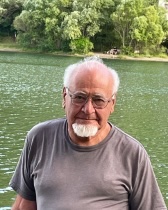Boris Gasparov
Columbia University

Boris Gasparov was born in 1940 in Rostov-on-Don (then USSR). After graduating from Rostov University, he continued my education in Moscow with graduate studies in linguistics and studies in musicology. In 1966-80 Gasparov taught at Tartu University, Estonia. Having left the Soviet Union in 1980, he proceeded teaching at UC Berkeley, and from 1992 until his retirement in 2017, at Columbia University. In the 2010s, Gasparov was also actively involved in creating a program in the humanities, modeled after American and European comparative and cultural studies, in Saint Petersburg; this work, however, came to an end in February, 2022.
His original scholarly interests were focused on Slavic and general linguistics, alongside attempts to apply principles of linguistic structuralism to musical analysis. Gasparov's participation in manifold interdisciplinary activities of the framework of the Tartu–Moscow school of semiotics resulted in expanding his interests into the domains of literary theory and Russian literature, particularly of the age of Romanticism and modernism, and eventually, to questions of comparative cultural history and the history of ideas. In his scholarly work, Gasparov tried to maintain a dialogue between different scholarly disciplines and areas of knowledge.
Main works include book-length studies of Pushkin, Boris Pasternak, and Ferdinand de Saussure, a book on the theory of meaning (Speech, Memory, and Meaning), a study of Russian music and its cultural contexts (Five Operas and a Symphony), and a number of works on various topics in Russian literature and medieval studies. At present, Gasparov has just finished a book on the philosophy of the Jena pre-Romantic circle (The Athenaeum Moment: The Principle of Poly-Subjectivity in Friedrich Schlegel's and Novalis' Philosophy of Conscious and Culture, 1795-1800). His current projects include a study of cultural contexts of Kant's critical philosophy ("Kant and His Interlocutors"), and a critical reappraisal of Nikolai Marr's "New Teaching about Language" in the context of European and early Soviet modernism
View Articles:
Lost and not found: The Course in General Linguistics between “Saussurism” and “Saussurology”
